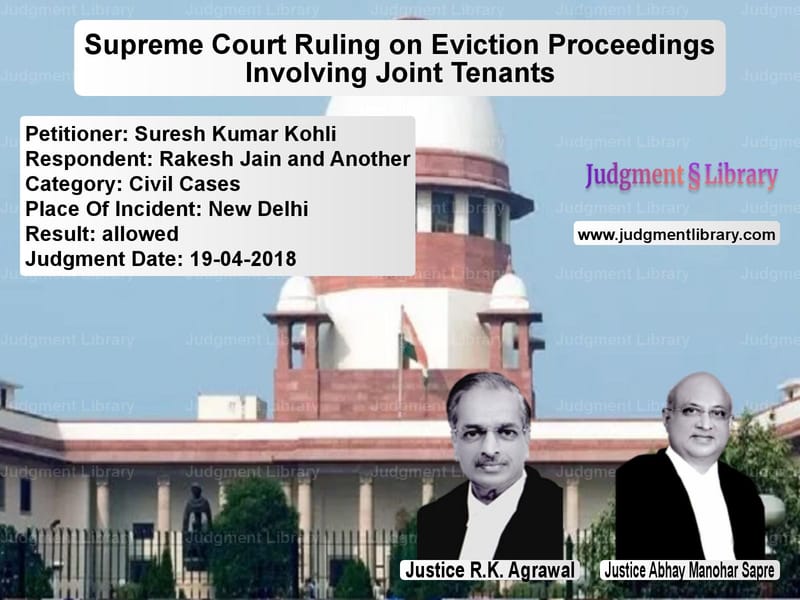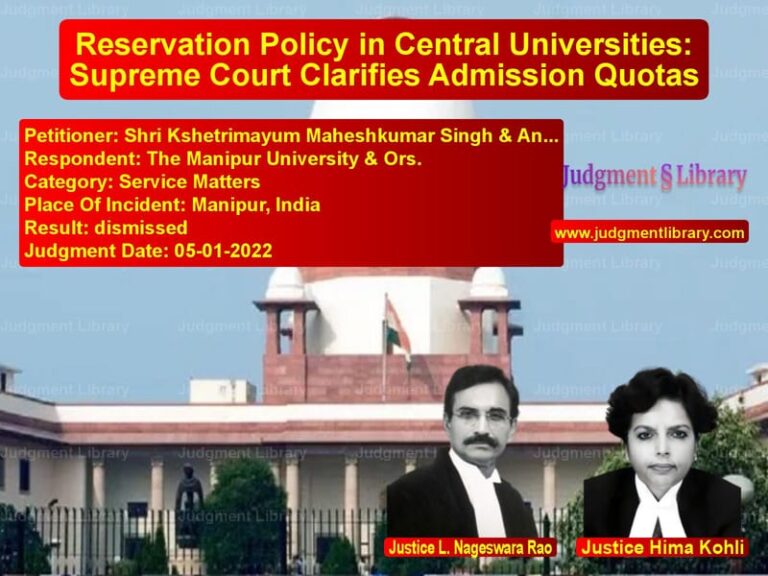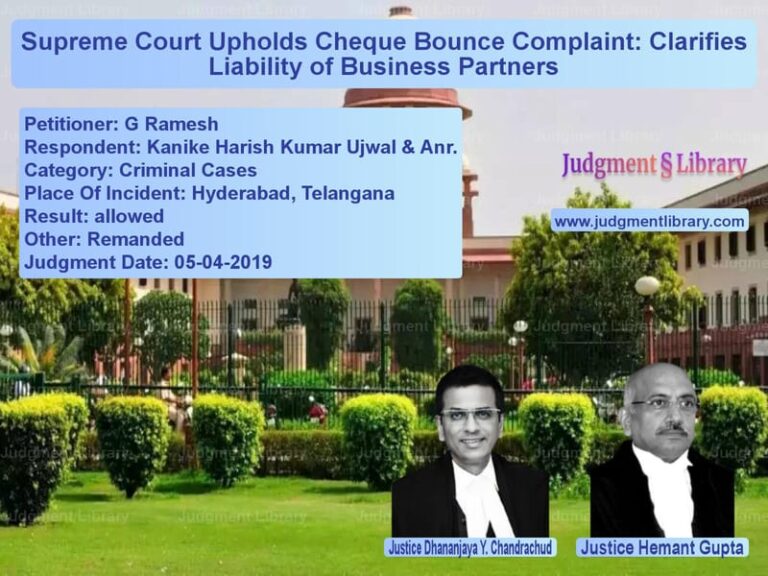Supreme Court Ruling on Eviction Proceedings Involving Joint Tenants
The case of Suresh Kumar Kohli v. Rakesh Jain and Another revolved around a dispute related to the eviction of tenants from a commercial property in New Delhi. The core issue at hand was whether, after the death of one of the original tenants, the tenancy rights passed to the heirs as joint tenants or tenants-in-common, and whether eviction proceedings could be initiated against one of the heirs without involving all legal representatives.
Background of the Case
The appellant, Suresh Kumar Kohli, owned a shop at Ajmal Khan Road, Karol Bagh, New Delhi, which was initially let out in 1975 to two tenants: Shri Ishwar Chand Jain and Shri Ramesh Chand Jain. They operated a family business under the name ‘M/s Rakesh Wool Store.’ The respondent Rakesh Jain was inducted as a partner in the business in 1979. The tenancy was a joint one, and the premises were being used for business purposes.
In 2009, Kohli issued a legal notice to both tenants, terminating their tenancy agreement with effect from May 31, 2009. However, the tenants did not vacate the premises. Kohli then filed an eviction petition under Section 14(1)(e) of the Delhi Rent Control Act, 1958, on the grounds of bona fide requirement.
The Additional Rent Controller ruled in favor of Kohli on November 30, 2011, granting the eviction. The respondent, Ramesh Chand Jain, challenged this order by filing a Rent Control Revision before the Delhi High Court, which dismissed the appeal. The respondent then filed a review petition, which was also dismissed.
Meanwhile, Rakesh Jain, the son of Ishwar Chand Jain, raised objections in the execution proceedings, claiming that he had inherited the tenancy rights after his father’s death and that he was not a party to the original eviction petition. This objection was dismissed by the Additional Rent Controller, leading to further appeals.
Arguments by the Appellant (Suresh Kumar Kohli)
The appellant’s counsel, Mr. Dhruv Mehta, argued that:
- Rakesh Jain, as the heir of the deceased tenant, was already part of the eviction process, and his interests were represented by his brother, who was one of the legal representatives.
- The tenancy was jointly held by both tenants, and after the death of one, the rights to the property passed to the surviving tenant and the legal heirs.
- Since the tenancy was joint, the landlord was entitled to initiate eviction proceedings against any of the joint tenants and could proceed without impleading all heirs.
- The High Court’s ruling that Rakesh Jain was a necessary party was incorrect, as the eviction petition was valid and maintainable even without him being named.
Arguments by the Respondent (Rakesh Jain)
The respondent’s counsel, Mr. Huzefa Ahmadi, countered by stating:
- The death of the original tenant, Ishwar Chand Jain, created a tenancy-in-common among the legal heirs, not a joint tenancy.
- According to Section 19 of the Hindu Succession Act, the legal heirs would inherit the tenancy as tenants-in-common, each having a distinct share in the tenancy.
- Rakesh Jain was a necessary party to the eviction proceedings as he was a co-tenant and had an equal right over the property.
- The High Court correctly interpreted the law by applying Section 19 of the Hindu Succession Act, which mandates that the heirs of a deceased tenant inherit the tenancy rights jointly.
Supreme Court’s Judgment
1. Status of the Heirs After the Death of the Tenant
The Supreme Court delved into the question of whether the tenancy rights passed to the heirs as joint tenants or tenants-in-common. The Court observed that while joint tenants share an undivided interest in the property, tenants-in-common have distinct shares. The Court made the following observation:
“The status of the legal heirs of the deceased tenant, in this case, must be determined by examining the nature of the tenancy and the rights inherited by them. In the present case, the tenancy was a joint tenancy, and upon the death of the original tenant, the legal heirs succeeded as joint tenants.”
The Court further explained the legal distinction between joint tenancy and tenancy-in-common:
- Joint Tenancy: In joint tenancy, there is unity of possession, interest, title, and time, and the death of one tenant results in the survivorship principle, where the interest passes to the surviving joint tenants.
- Tenancy-in-Common: In tenancy-in-common, each tenant has a separate, distinct share in the property, and there is no right of survivorship. The shares of the deceased tenant pass on to their legal heirs, who inherit them as tenants-in-common.
2. Application of the Hindu Succession Act
The Supreme Court also considered the application of the Hindu Succession Act, 1956, to the case, particularly Section 19, which governs the mode of succession for heirs of a deceased Hindu. The Court held that:
“The tenancy rights devolve on the legal heirs of the deceased tenant in accordance with the Hindu Succession Act, which treats the inheritance of tenancy rights as part of the broader inheritance of property.”
The Court cited H.C. Pandey v. G.C. Paul (1989) to reinforce the view that tenancy rights pass to the heirs as joint tenants, with the incidents of tenancy remaining the same as those enjoyed by the original tenant.
3. Impleading All Legal Heirs in Eviction Proceedings
The Court rejected the respondent’s claim that all heirs must be impleaded in the eviction proceedings. It observed:
“Once the tenancy is treated as a joint tenancy, eviction proceedings against one joint tenant are sufficient to bind all co-tenants. The eviction order applies to all the joint tenants, even if they are not individually named in the petition.”
The Court emphasized that as long as one of the joint tenants is in possession of the property and is a party to the eviction proceedings, it is unnecessary to implead all the legal heirs.
4. Deliberate Delay in Objections
The Court found that Rakesh Jain’s objections to the eviction order were filed after a significant delay and were aimed at frustrating the eviction process. It stated:
“The intervention at this belated stage, after the legal heirs had already been part of the proceedings, appears to be a deliberate attempt to nullify the eviction decree.”
Final Ruling
The Supreme Court allowed the appeal and restored the order of the Additional Rent Controller. The eviction petition filed by Suresh Kumar Kohli against Ramesh Chand Jain was upheld, and Rakesh Jain’s objections were dismissed. The Court concluded:
- The tenancy rights were inherited by the legal heirs as joint tenants.
- Eviction proceedings against one joint tenant were sufficient to cover all co-tenants.
- The High Court’s order requiring Rakesh Jain to be impleaded was overturned.
Key Takeaways from the Judgment
- The death of a joint tenant results in the heirs inheriting tenancy rights as joint tenants, with all co-tenants sharing equal rights over the property.
- Eviction proceedings against one joint tenant are sufficient to bind all joint tenants.
- Tenancy rights are subject to the Hindu Succession Act, with joint tenancy being the default position unless explicitly stated otherwise.
- Delays in filing objections to eviction orders may be seen as attempts to obstruct the legal process.
Conclusion
This case reaffirms the principle that tenancy rights, once devolved on heirs, are treated as joint tenancy unless clearly specified otherwise. The judgment also clarifies the procedural requirements for eviction cases involving joint tenants and highlights the importance of timely objections in legal proceedings.
Petitioner Name: Suresh Kumar Kohli.Respondent Name: Rakesh Jain and Another.Judgment By: Justice R.K. Agrawal, Justice Abhay Manohar Sapre.Place Of Incident: New Delhi.Judgment Date: 19-04-2018.
Don’t miss out on the full details! Download the complete judgment in PDF format below and gain valuable insights instantly!
Download Judgment: Suresh Kumar Kohli vs Rakesh Jain and Anot Supreme Court of India Judgment Dated 19-04-2018.pdf
Direct Downlaod Judgment: Direct downlaod this Judgment
See all petitions in Contract Disputes
See all petitions in Property Disputes
See all petitions in Landlord-Tenant Disputes
See all petitions in Judgment by R K Agrawal
See all petitions in Judgment by Abhay Manohar Sapre
See all petitions in allowed
See all petitions in supreme court of India judgments April 2018
See all petitions in 2018 judgments
See all posts in Civil Cases Category
See all allowed petitions in Civil Cases Category
See all Dismissed petitions in Civil Cases Category
See all partially allowed petitions in Civil Cases Category







